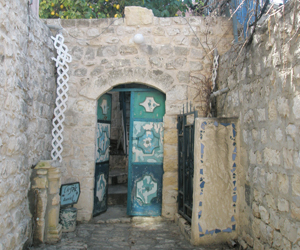A Rabbi For His Time
It was the eve of Passover, 1948, in the little town of Safed. This year, Passover fell on the Sabbath, giving the air a special flavor of being both a Sabbath and a holiday. But times were tense, since besides being a Sabbath and a holiday, it was also wartime, Israel's War of Independence, to be exact.
Local Palmach troops were busying themselves barricading the city in expectation of the town becoming a warfront. Rabbi Avraham Zeida Heller, a spiritual leader for the town of Safed, along with his colleague Rabbi Ephraim Weingott, realized that the existence of the town and the survival of the townspeople depended upon the barricade's completion, and so waived the Halachic (Jewish legal) responsibility to avoid working on the Sabbath and the holiday. Heller and Weingott issued a legal decision to this effect.
Mental Turmoil
In his book, The Battle Over Safed: Legend and Reality, Rabbi Heller described his mental turmoil after Palmach staff members asked his permission to work on the Sabbath. "The nature of this request caught me off-guard; my mind was torn over the points of the debate. I never had to stand on a decision made so quickly on a matter of such serious import. The severe halachic responsibility of a Jewish rabbi to instruct Jews to make their Shabbat and holiday profane and go to work…"
Rav Heller found the decision difficult: did this type of work, intended to save lives, constitute an action worthy of superseding the laws of the Sabbath? After he weighed the potential serious security consequences of the situation should the barricades not be completed, he concluded that, "this work is not only allowed on the Sabbath but is a commandment and a duty. Even I myself must help and participate at this time."
On Friday, April 23, 1948, a day before Pesach, the rabbi made known his decision in a public announcement. Rabbi Heller convinced his colleague, Rabbi Weingott to affix his signature to the decision. Here follows the text of the legal decision:
Legal Decision
"Bless God. From the holy city of Safed, may it be rebuilt and reestablished, on the eve of Passover, in the year of 5708.
Notice: It has come to our attention that some of the barricade work within our city is needed to defend the lives of the public. Therefore we inform the public: It is permitted and it is even a commandment and a duty to continue the barricade work, as described above, tomorrow on the Holy Sabbath and Passover that are about to arrive, by God, may He be blessed, by the mercy of his cherubs may we be saved from all our enemies and may He lead us from darkness to light and from slavery to redemption speedily in our days, Amen."
Alongside Them
Heller went above and beyond even this deed and led the religious residents of Safed to the barricades where he worked alongside them. His actions gave them strength and faith, cheering the fighters and weary residents.
The Heller/Weingott decision and Heller's activism as a leader had great impact on the town's success against the Syrian, Lebanese, and Iraqi forces. By dint of his legal decision, a special relationship grew between him and the Palmach who gave him the Semel HaKomemiyut, the Medal of Freedom From Tyranny.

